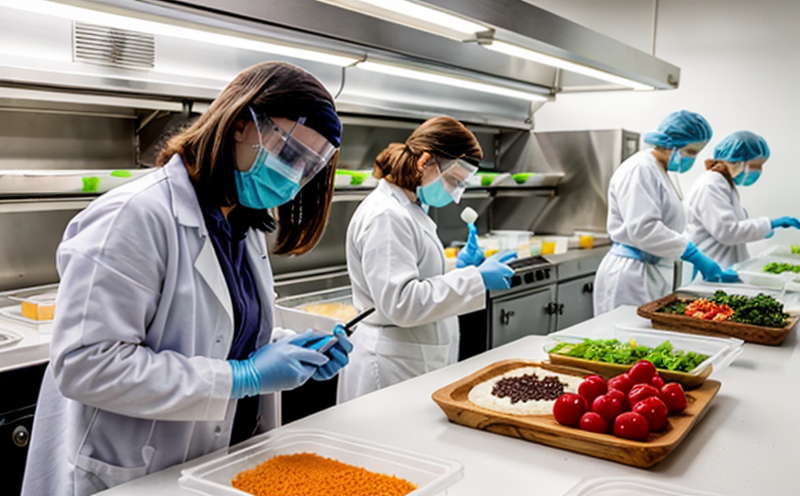ISO 16266 Pseudomonas aeruginosa Testing in Food Samples
The presence of Pseudomonas aeruginosa in food samples can pose significant risks, especially for individuals with compromised immune systems. This bacterium is known to thrive under a wide range of environmental conditions and can cause severe infections. Our ISO 16266-compliant testing service ensures that food manufacturers and processors adhere to stringent quality control standards.
Our expert team utilizes advanced microbiological techniques, including culture-based methods and molecular detection systems, to identify Pseudomonas aeruginosa. These tests are conducted in a controlled environment with strict adherence to ISO 16266 guidelines. The process begins by collecting samples from various stages of the food production line. Samples can include raw ingredients, intermediate products, finished goods, and final packaging.
For each sample type, our laboratory technicians perform initial assessments to ensure proper preservation and handling before processing. This step is critical in maintaining accurate results throughout the testing process. Following sample preparation, we employ culture methods where appropriate or use PCR-based techniques for rapid detection. Our laboratories are equipped with state-of-the-art equipment, including real-time polymerase chain reaction machines (PCR) and automated microbial identification systems.
The analytical procedures follow ISO 16266:2009 standards, which specify detailed protocols for sample preparation, inoculation, incubation periods, and final identification steps. These guidelines are designed to minimize variability and ensure consistent results across different laboratories worldwide. Once testing is complete, our team generates comprehensive reports detailing the test methodology used, any anomalies detected during analysis, and recommendations for corrective actions if necessary.
By providing ISO 16266-compliant tests for Pseudomonas aeruginosa, we help clients maintain their compliance with international standards while ensuring product safety. Our rigorous quality assurance measures guarantee reliable outcomes that can be trusted by both internal stakeholders and external partners.
Our commitment to excellence extends beyond just meeting regulatory requirements; we also strive to support continuous improvement within your organization. Through regular communication about test results and trends, as well as offering guidance on best practices in microbiological testing, we aim to foster long-term partnerships built on trust and mutual understanding of our clients' needs.
Our team understands that every client has unique requirements when it comes to food safety and quality assurance. That’s why we offer flexible packages tailored specifically for your business. Whether you need one-off tests or ongoing monitoring, we have the expertise and resources to meet those expectations consistently.
Scope and Methodology
| Sample Type | Treatment Procedure | Inoculation Method | Incubation Period | Identification Techniques |
|---|---|---|---|---|
| Raw Ingredients | Cool storage, no treatment required. | Selective media inoculation followed by overnight incubation at 35°C ±2°. | Incubate for 18-24 hours. | API® 50 CHROM panels and MALDI-TOF MS. |
| Intermediate Products | Cool storage, no treatment required. | Selective media inoculation followed by overnight incubation at 35°C ±2°. | Incubate for 18-24 hours. | API® 50 CHROM panels and MALDI-TOF MS. |
| Finished Goods | Cool storage, no treatment required. | Selective media inoculation followed by overnight incubation at 35°C ±2°. | Incubate for 18-24 hours. | API® 50 CHROM panels and MALDI-TOF MS. |
Quality and Reliability Assurance
We maintain high levels of quality assurance through rigorous internal audits, external certifications, and continuous training for our staff. Our laboratories are accredited to ISO/IEC 17025:2017 standards, ensuring that all testing procedures comply with international best practices.
Our commitment extends beyond mere compliance; we actively participate in proficiency testing programs recognized globally. Participation in these programs helps validate the accuracy and precision of our results against industry benchmarks.
We invest heavily in maintaining state-of-the-art equipment to ensure accurate readings and timely delivery of reports. Regular calibration checks are performed by certified technicians, ensuring that all instruments operate within specified tolerances.
In addition to technical proficiency, we place great emphasis on delivering clear communication with our clients regarding the status of their samples throughout the testing process. Timely updates via email or phone calls help manage expectations and provide peace of mind knowing that nothing is left to chance.
Customer Impact and Satisfaction
Our services play a crucial role in enhancing customer confidence by ensuring the safety and quality of food products. By identifying potential issues early on, our testing helps prevent recalls and lawsuits that could harm brand reputation.
Furthermore, successful completion of ISO 16266-compliant tests demonstrates commitment to maintaining high standards of hygiene throughout the supply chain. This not only fosters trust among consumers but also strengthens relationships with suppliers who meet these stringent criteria.
Our focus on customer satisfaction is reflected in our proactive approach towards addressing concerns promptly and transparently. Whether it’s providing detailed explanations about test results or offering advice on corrective measures, we aim to exceed expectations every time.





